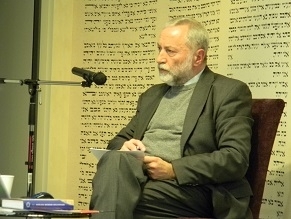|
Euroasian Jewish News

EAJC GC Chairman Josef Zisels listens to questions. Photo by Elena Zaslavskaya.
|
Public Lecture of EAJC General Council Chairman Josef Zisels
14.11.2013 On November 13, 2013, the HaTikvah Kyiv Center for Progressive Judaism hosted a lecture by Euro-Asian Jewish Congress (EAJC) General Council Chairman Josef Zisels titled “All-Ukrainian Union ‘Svoboda’: Myths and Reality.”
In his lecture Josef Zisels explored how xenophobia and the political parties exploiting it in their rhetoric in Ukraine compare to other European countries, basing his conclusions on rich factual evidence. By using data on hate crimes, particularly on anti-Semitic crimes, data on the electoral results of national-radical political parties on elections of various levels, as well as data collected in sociological studies, the EAJC General Council Chairman gave conclusive evidence that there is no reason to start a panic about the “growth of anti-Semitic tendencies” in Ukraine. There is insufficient evidence to speak of any significant threat to ethnic minorities from the national-radical political groups. “Svoboda’s” success at the last parliamentary elections was not due to any kind of growth of xenophobic tendencies in Ukrainian society. A sociological study held at the initiative of Josef Zisels conclusively shows that, far from being a significant factor in drawing in electoral support, the xenophobic utterances of some of Svoboda’s functionaries were mostly seen as irrelevant by its electorate. There are also grounds to state that in the last year, since Svoboda stopped being a radical street movement and is learning the parliamentary rules to political competition, this political party is evolving into a more temperate direction. The Jewish community has no reasons to deny that Svoboda’s political figures do say anti-Semitic things; however, they must be adequately placed in the context of the party’s ideology and activities as well as in the general social and political context.
In the interim, over the last year and half the media have been consciously and purposefully creating a totally inadequate image of Svoboda as a real large-scale threat to the Jewish community and to other ethnic minorities. An image of Ukraine as an anti-Semitic and Fascist country is also being created at the same time. Zisels believes that this is done at the behest and under the control of powers connected to the current executive authorities of Ukraine, so as to create a false dichotomy of two main political forces in Ukraine: the government and the “Fascists.” Thus, the entire opposition, working together with “Svoboda” is depicted as Fascist. As far as one can judge, this political campaign is just beginning in light of the Presidential elections of 2015. A successful implementation of this political scenario is likely to pit the ethnic minorities against a great part of Ukrainian society that associates itself with the political opposition to the current government.
A lively discussion followed the lecture, in which Alexander Dukhovny (EAJC General Council member, Head Rabbi of the Progressive Judaism community) took an active part.
|
|
